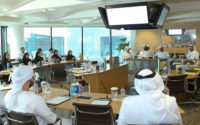Governments Can Benefit By Embracing Innovation, Disruption: GIES Panellists
Governments that are willing to embrace change, foster innovation and adopt disruptive technologies can gain a competitive edge as they adapt to the Fourth Industrial Revolution.
That was the consensus among government officials and industry experts who spoke on the topic at the Global Islamic Economy Summit (GIES 2018) in Dubai. Over 3,000 key decision makers, policymakers, business leaders and industry experts from around the world are attending the two-day summit, which is the world’s largest event dedicated to all aspects of the Islamic economy.
Joining the panel session entitled Designing a Shared Future in the Age of Disruption and Divergence were H.E. Chiara Appendino, Mayor of Turin, Italy; Taliya Minullina, Chief Executive of Tatarstan Investment Development Agency; Hamad Abdulmohsen Al-Marzouq, Chairman of Kuwait Finance House, Najeeb Mohammed Al-Ali, Executive Director of the Expo 2020 Bureau; and Ayman Amin Sejiny, CEO of the Islamic Corporation for the Development of the Private Sector (ICD), KSA.
Sharing her city’s experience of embracing new technologies, H.E. Chiara Appendino, Mayor of Turin, Italy said: “Turin is a progressive city and is bold in adopting new ideas. We are ready to face the challenge of innovation. You have to have an environment ready to test innovation.”
Najeeb Mohammed Al-Ali, Executive Director of the Expo 2020 Bureau, said: “With innovation comes change and with change comes growth. We are navigating a new landscape and require new solutions.” He added that many innovations had been revealed at expos – from the X-ray machine to the fax machine and mobile phone.
“World expos are a showcase of what the world has to offer. Our future is a shared one and that’s why Expo 2020 is so important. We are bringing together more than 200 countries to connect minds. It is a celebration of ingenuity. More than 25 million visitors – 75 per cent from abroad – are expected from all walks of life. At Expo 2020 we see disruption as an opportunity,“ Al Ali added.
Ayman Amin Sejiny, CEO of the Islamic Corporation for the Development of the Private Sector (ICD), KSA advocated government involvement in disruption but said that authorities should not overstep the mark. “We need to keep pace from a government perspective. The government needs to get involved from the start and know when to step back,” he said.
Taliya Minullina, Chief Executive of Tatarstan Investment Development Agency, said that failure was as much a part of innovation as success. “The world is completely different now, there is another way of thinking. People in their 20s, the Millennials, think differently from me. When we think about innovation we think about success, but in fact it is more about failures and mistakes,” she said.
Hamad Abdulmohsen Al-Marzouq, Chairman of Kuwait Finance House, stressed the importance of setting clear objectives and expressed his view that the number one priority for financial institutions is security of data. “We need to reduce bureaucracy – technology is evolving at a dizzying speed,” he said.
Held under the patronage of His Highness Sheikh Mohammed bin Rashid Al Maktoum, Vice President and Prime Minister of the UAE and Ruler of Dubai, GIES 2018 is organised under the theme “A Shared Future”, putting the spotlight on challenges and opportunities in the global Islamic economy. The high-level summit is organised by Dubai Chamber of Commerce and Industry and the Dubai Islamic Economy Development Centre in cooperation with Thomson Reuters as a Strategic Partner.







